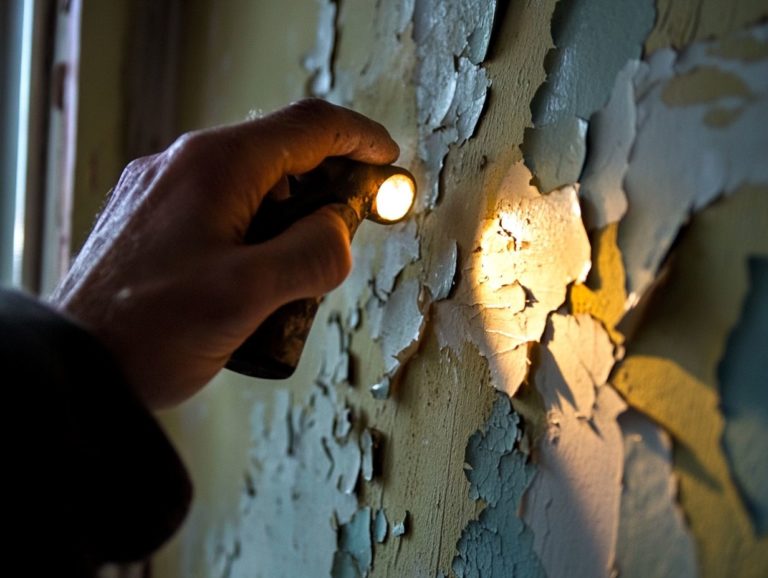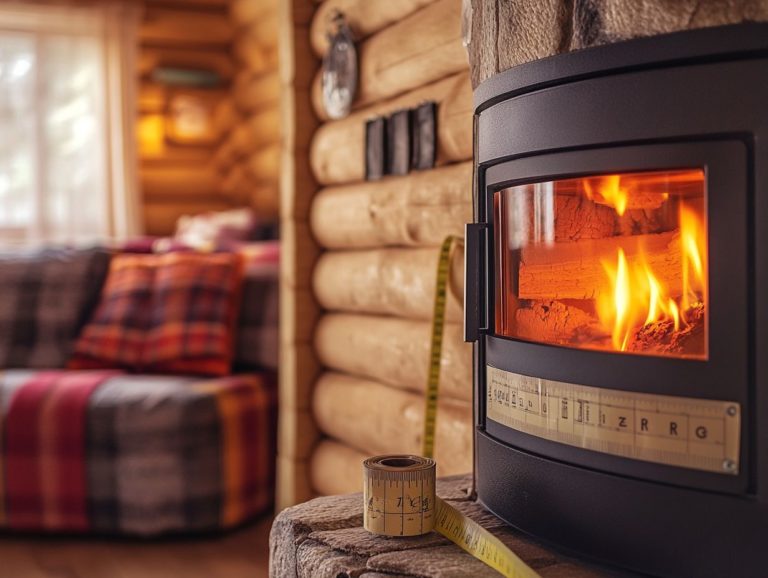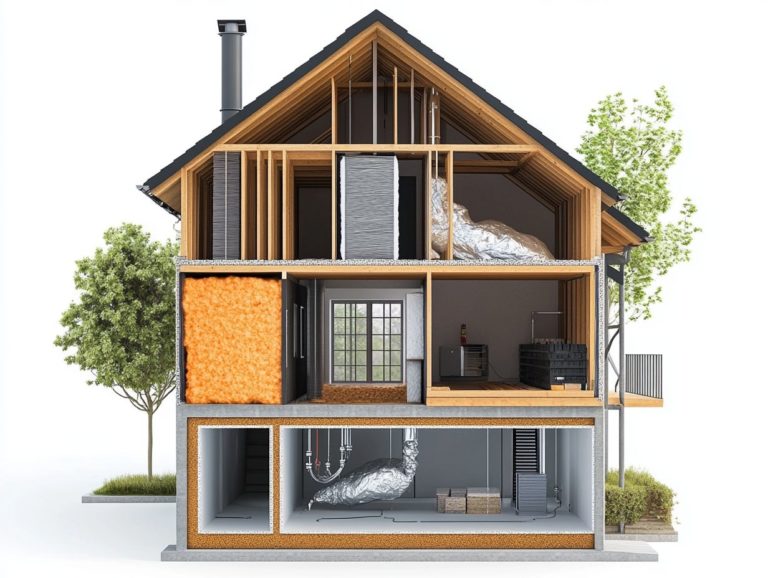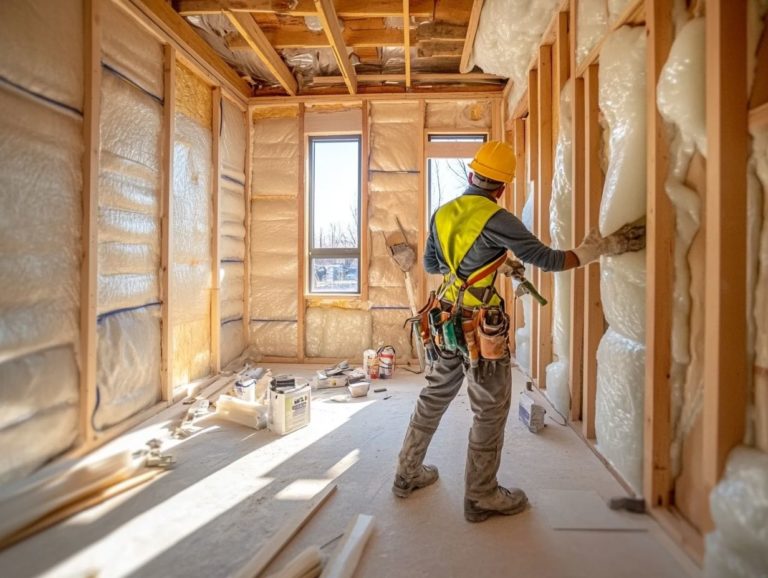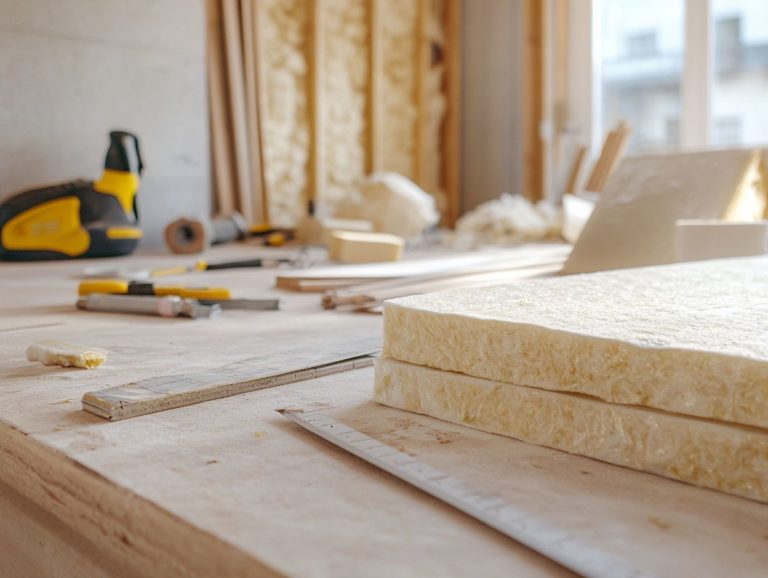Understanding the Cost-Benefit of Insulation
Insulation is vital for enhancing energy efficiency and ensuring comfort in your home. This article explores the various types of insulation materials, highlighting their unique benefits and costs. You will learn what influences insulation expenses, the potential savings on your energy bills, and important considerations for selecting the ideal insulation for your needs.
We will weigh the pros and cons of DIY versus professional installation, helping you make the best choice for your home. Get ready to transform your home into a cozy, energy-efficient haven!
Contents
- Key Takeaways:
- The Importance of Insulation
- Types of Insulation
- Factors Affecting Insulation Cost
- Cost Savings from Insulation
- Considerations When Choosing Insulation
- DIY vs Professional Installation
- Frequently Asked Questions
- What is insulation and why is it important?
- How does insulation save money in the long run?
- What are the different types of insulation?
- How do I determine the cost-benefit of insulation for my home?
- Can I install insulation myself to save money?
- Are there any government incentives or rebates for installing insulation?
Key Takeaways:
- Insulation is crucial for energy efficiency and reducing energy bills.
- The type and quality of insulation, as well as your home’s size, affect its cost.
- Consider the balance between cost and benefits when choosing insulation.
- Weigh the pros and cons of DIY versus professional installation.

The Importance of Insulation
Insulation is essential for improving energy efficiency in your home. It significantly lowers heating and cooling costs, enhances comfort, and increases your property s value. The Department of Energy emphasizes that effective insulation and air sealing offer cost-effective solutions for homeowners and lead to significant energy savings over time.
As environmental concerns grow, investing in quality insulation is increasingly important for reducing energy consumption and minimizing carbon emissions.
Understanding Energy Efficiency
Understanding energy efficiency is crucial for homeowners wanting to cut energy bills and improve living conditions. It relates to how well insulation materials perform, measured by R-values. R-value measures how well insulation resists heat flow. The higher the R-value, the better the insulation.
Energy efficiency not only boosts your comfort but also reduces your home’s carbon footprint, making it an environmentally friendly choice. By conducting thorough energy assessments, you can identify where energy loss occurs and take focused actions to improve your insulation.
Choosing insulation with optimal R-values is essential for maintaining a consistent temperature year-round, regardless of outdoor conditions. Proper insulation acts as a barrier against heat transfer, reducing reliance on heating and cooling systems. Ultimately, achieving higher energy efficiency through the right insulation allows you to save money while contributing to a more sustainable future.
Types of Insulation
There are various insulation options available today, each with distinct features and advantages. From the versatility of spray foam to the reliability of fiberglass batt and the eco-friendliness of cellulose insulation, each type offers different R-values and effectiveness for various applications.
Overview of Different Materials
An overview of insulation materials reveals unique benefits. Spray foam insulation expands to fill gaps, creating a tight seal that effectively minimizes air leaks. Its impressive R-value provides exceptional thermal resistance, making it a favored choice for new constructions and retrofits alike.
Fiberglass insulation, made of fine glass fibers, comes in batts or loose-fill forms. Professional installation is typically required to ensure effective coverage and minimize gaps.
Cellulose insulation, an eco-friendly option made from recycled paper, has a lower R-value compared to spray foam. It is treated for fire resistance but requires careful installation to perform optimally.
By understanding these nuances, you can make informed choices that meet your specific comfort and energy efficiency needs.
Factors Affecting Insulation Cost

The cost of insulation is influenced by several factors, including your home’s size and the quality of the materials you choose. Understanding these elements empowers you to make informed, cost-effective decisions about insulation.
Take the next step towards a more comfortable, energy-efficient home today!
Size of Home and Material Quality
The size of your home plays a crucial role in determining your overall insulation costs. Larger spaces demand more materials and labor. The quality of the insulation material you choose directly influences your potential energy savings.
If you own a spacious house, you ll likely need extensive insulation coverage, leading to higher upfront expenses. However, opting for high-performance insulation materials like closed-cell spray foam can significantly reduce your heating and cooling needs. While your initial investment might be higher, the exceptional thermal resistance could translate into lower utility bills over time.
On the other hand, going for lower-grade insulation might save you some cash upfront, but it could leave you dealing with higher energy bills due to insufficient temperature regulation. The relationship between your home’s size and the quality of insulation you choose greatly impacts both your immediate expenses and long-term financial health.
Cost Savings from Insulation
Investing in insulation can lead to substantial cost savings, often resulting in noticeably reduced heating and cooling expenses.
This makes insulation upgrades a smart and cost-effective investment in enhancing your home’s energy efficiency.
Impact on Energy Bills
The impact of insulation on your energy bills is remarkable. Effective insulation upgrades often lead to significant reductions in monthly expenses, offering a cost-effective way to manage energy consumption.
For the average household, investing in high-quality materials like spray foam or rigid foam boards can yield savings of up to 30% on energy bills, especially during extreme weather months.
Homes with inadequate insulation lose heated air in winter, causing heating systems to work overtime and consume more energy. Upgrading to fiberglass batts or cellulose not only enhances thermal resistance but also fosters stable indoor temperatures, resulting in fewer heating and cooling cycles.
As homeowners become increasingly aware of these long-term benefits, many discover that investing in superior insulation can pay for itself within just a few years.
Considerations When Choosing Insulation
Be sure to keep these key factors in mind when choosing insulation:
- Cost-effectiveness
- Potential energy efficiency benefits
- Importance of proper air sealing
Each of these elements plays a vital part in maximizing the overall effectiveness of your insulation choice.
Balancing Cost and Benefits

Balancing cost and benefits is crucial for homeowners selecting insulation; it ensures optimal energy efficiency while remaining within your budget, making it important to consider understanding the importance of insulation.
To evaluate your insulation options effectively, consider factors like the initial investment, installation costs, and potential long-term savings on energy bills.
While fiberglass batts might seem like a budget-friendly choice, spray foam insulation could offer greater energy savings down the line due to superior air-sealing capabilities.
Assess the return on investment by weighing improvements in comfort, such as reduced drafts and consistent temperatures, which significantly contribute to your overall satisfaction in your living space.
By carefully analyzing these trade-offs, you can make informed decisions that align with your financial goals and enhance your home s value.
DIY vs Professional Installation
In terms of insulation, you find yourself at a crossroads between tackling the installation yourself or enlisting professional help.
Each path offers distinct advantages and considerations, especially regarding cost-effectiveness and the quality of the final result.
Pros and Cons of Each Option
Deciding between DIY and professional insulation installation is a big choice for homeowners. Each option has its own pros and cons.
When weighing your options, consider factors like cost savings, labor intensity, and the skills needed for proper installation. DIY might seem budget-friendly at first, but it requires a solid understanding of insulation materials and techniques for the best results.
Professional installation may cost more upfront, but it usually comes with quality assurance and warranties. This can ease worries about mistakes that could lead to long-term energy inefficiency, ultimately affecting your overall savings.
For example, you could insulate your garage yourself, but if you neglect proper air sealing in key areas, you might lose any short-term financial advantage.
Frequently Asked Questions
What is insulation and why is it important?
Insulation is key! It keeps your home cozy and cuts energy costs. It reduces heat loss or gain, helping to maintain a comfortable temperature inside, no matter the weather outside.
How does insulation save money in the long run?

Insulation saves money by reducing energy consumption, leading to lower utility bills. It also extends the lifespan of heating and cooling systems, reducing maintenance and replacement expenses.
What are the different types of insulation?
There are several types of insulation, including fiberglass, cellulose, spray foam, and rigid foam. Each type has its own benefits and is suitable for different areas of a building.
How do I determine the cost-benefit of insulation for my home?
The cost-benefit of insulation depends on factors like the type of insulation, the size and structure of your home, and your local climate. To navigate this, it’s best to consult with a professional for an accurate assessment and consider understanding the insulation installation process for a more informed decision.
Can I install insulation myself to save money?
While it’s possible to install insulation yourself, it’s not recommended unless you have experience and knowledge in building insulation. Improper installation can lead to reduced effectiveness and safety hazards. Hiring a professional is the best choice for proper installation.
Are there any government incentives or rebates for installing insulation?
Yes! There are often government incentives and rebates available for homeowners who install insulation. These can vary by location and change over time. Be sure to research and inquire about potential incentives before proceeding with your insulation project.

